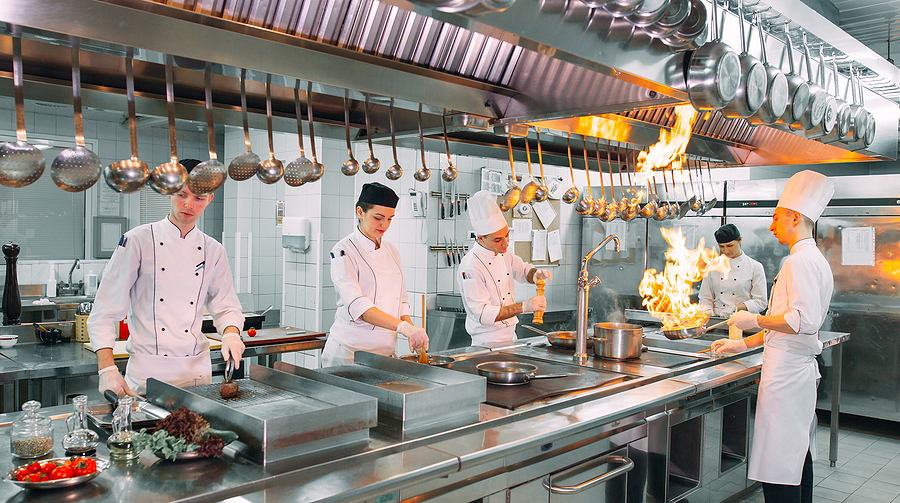Cooking relies heavily on fire. The saying goes, “If you can’t stand the heat, get out of the kitchen.” When we have mastery of fire, it serves at our command. However, uncontrolled fire is a terrifying beast that can rapidly bring even the most accomplished chefs to their knees.
Adhering to the fire prevention measures described here will reduce the likelihood of a catastrophic fire occurring in a commercial kitchen.
Take Care of Oil Splatters
Maintaining a clean kitchen is a crucial aspect of preventing fires. Grease is extremely combustible. A wildfire will seek out any fuel it can find as it spreads.
The grease that accumulates in the kitchen is like gasoline for a fire. Ensure that you have a regular cleaning schedule that removes any oil buildup from surfaces.
Maintain Cooking Equipment
The kitchen is responsible for 57% of all restaurant fires. Make sure all equipment is properly operating and fitted with current fire suppression systems.
In the event of a fire, these devices cut off the gas and electricity, preventing the blaze from spreading further. Has an expert inspected your fire suppression systems?
Confirm the Functionality of the Sprinkler System
When a fire in your kitchen reaches a certain threshold, the sprinklers in the ceiling will go off automatically.
Nobody should go in there now since the fire has grown so big. If a fire breaks out in the kitchen and gets out of hand, the sprinklers are your last line of defense and could save the business.
Always Keep Extra Fire Extinguishers on Hand
If the fire spreads, rapid response from crew members equipped with powerful fire extinguishers is essential.
The availability of a fire extinguisher may mean the difference between being out of commission for the night and being out of commission for weeks or even permanently.
Routine inspections prevent potential disasters by keeping fire extinguishers in good working order.
Dole out Appropriate Instruction
Every kitchen crew member needs to know how to put out different kinds of flames promptly and efficiently. In the event of a fire, every second counts.
Moreover, cooks and other kitchen workers should always take precautions to avoid starting fires while at work.
Keep combustibles away from open flames.
For a fire to burn, fuel is required. When something that shouldn’t be near the flames catches fire, it can quickly spread and get out of control.
Fires can be avoided if the kitchen is kept neat. The flame and its surroundings must constantly be in the cook’s vision. Towels are frequently used to carry hot cookware, although this might be anything from food to clothing to paper.
Make sure to be careful around cords that power appliances.
Some practice fires aren’t done in a range environment. Restaurants, like any other building, are at risk for electrical fires, so take extra precautions with electrical appliances.
The restaurant uses quite a few electrical devices. Your restaurant’s electrical system could be strained by multiple appliances running at once.
Electrical outlets in walls with poor construction may break. In time, wires and cables used in electricity might fray or even melt. Tell your staff to watch for damage and notify higher up if they notice anything suspicious.
Electrical problems may not always be visible, so it’s a good idea to have a professional come in for frequent checks.
Clean the Air Ducts of Grime
A restaurant’s ventilation system is highly combustible and can greatly amplify the effects of a fire. Grease, smoke, and other easily flammable particles are trapped throughout the system.
There should be routine checkups and cleanings of the hood, fan, and ductwork to keep grease and grime from accumulating. The NFPA Fire Code, which is recognized nationwide, mandated multi-annual checks.
It’s a bad idea to put water on a grease fire.
Nothing is worse than throwing water on an uncontrollable fire when everyone reacts too rapidly. Grease fires account for most kitchen fires.
Given the nature of a grease fire, this reaction will only heighten the flames and increase the risk of harm. That’s why it’s crucial to invest in skilled chefs.
If it’s safe, a grease fire should be put out.
Indoors is not the place to discard cigarettes.
In addition to cooking equipment, cigarettes are a common cause of fires in the kitchen. Many people in the food service sector smoke, but there are risks for more than just the smoker.
Never discard cigarettes indoors, and never in a container that also contains combustible materials. Often, the embers of a cigarette can be seen even after it appears to have been extinguished.
With enough time and the correct kindling, one small fire can quickly spread and destroy your company.
Think of a way out.
At the point at which a fire becomes unmanageable, egress is imperative. To live or die depends on whether you have a plan to get out of the situation you’re in.
In the event of a fire, you and the other patrons and personnel of the restaurant need to get out quickly and safely without provoking a stampede. Anxiety is never a good time to do this.
Fire drills are a great opportunity to practice escape routes and ensure everyone gets out safely.
